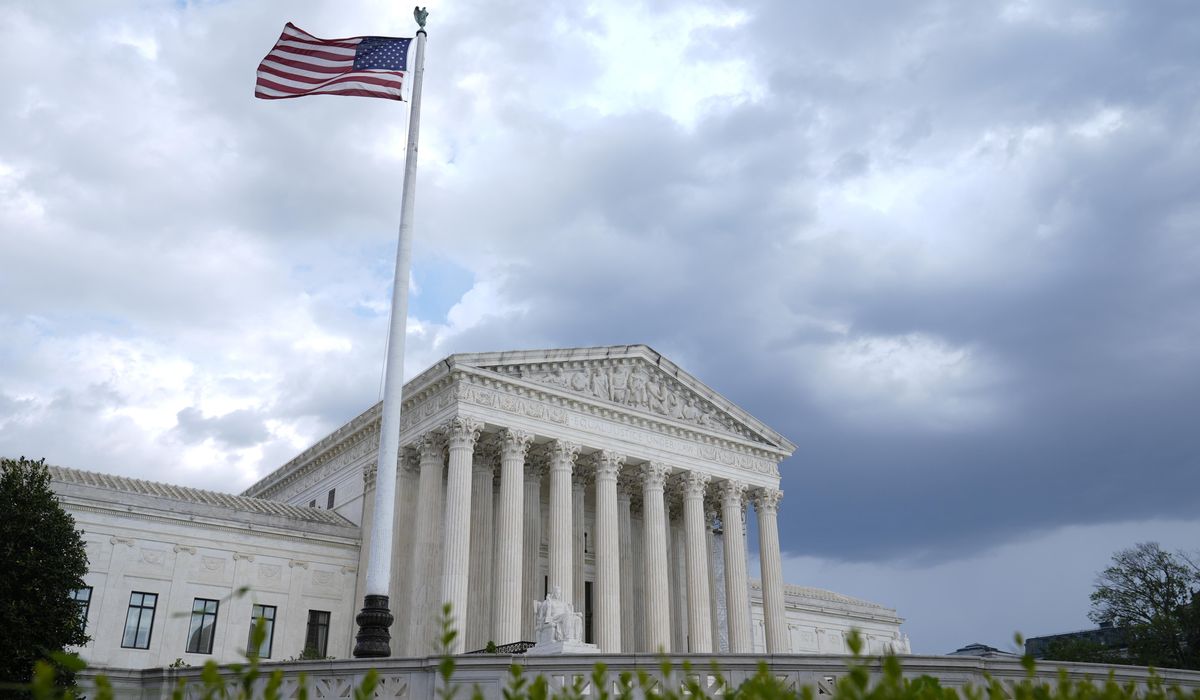


The Supreme Court ruled Monday that presidents enjoy “absolute immunity” for official acts taken under their core responsibilities and may have some immunity from criminal prosecution for other official behavior, but they do not enjoy immunity for unofficial acts.
The court, in a 6-3 ruling divided along ideological grounds, said it will be up to a lower court to sort out which of former President Donald Trump’s actions surrounding the 2020 presidential election breach those lines.
Chief Justice John G. Roberts Jr., writing the majority opinion, said presidents must have leeway to pursue their constitutional duties, but no president is entirely above the law. He said that’s the balance that courts must strike.
“Certain allegations — such as those involving Trump’s discussions with the Acting Attorney General — are readily categorized in light of the nature of the President’s official relationship to the office held by that individual. Other allegations — such as those involving Trump’s interactions with the Vice President, state officials, and certain private parties, and his comments to the general public — present more difficult questions. Although we identify several considerations pertinent to classifying those allegations and determining whether they are subject to immunity, that analysis ultimately is best left to the lower courts to perform in the first instance.”
The ruling is a procedural victory for Mr. Trump because it makes it unthinkable he could go to trial before Election Day.
But the court made clear the former president’s broad claims of absolutely immunity did not prevail.
“Trump asserts a far broader immunity than the limited one we have recognized. He contends that the indictment must be dismissed because the Impeachment Judgment Clause requires that impeachment and Senate conviction precede a President’s criminal prosecution,” Chief Justice Roberts wrote. “The text of the Clause provides little support for such an absolute immunity.”
He said the indictment against Mr. Trump accused him of four illegal acts: Asking the Justice Department to pressure states over their electoral counts; communicating with then-Vice President Mike Pence on not certifying the count; orchestrating alternate slates of electors; and using social media to talk to supporters who would go on to storm the Capitol.
The court said the communications with the Justice Department fall under core presidential powers and enjoy “absolute immunity.” The other three areas, though, are tricky and fact-specific questions that the justices said the district court must explore.
Justice Sonia Sotomayor, writing in dissent, said the ruling is dangerous. As one example, she said, it means a president could order a rival assassinated without facing legal consequences.
“The Court effectively creates a law-free zone around the President, upsetting the status quo that has existed since the Founding. This new official-acts immunity now “lies about like a loaded weapon” for any President that wishes to place his own interests, his own political survival, or his own financial gain, above the interests of the Nation,” she wrote. “The President of the United States is the most powerful person in the country, and possibly the world. When he uses his official powers in any way, under the majority’s reasoning, he now will be insulated from criminal prosecution.”
The case before the justices involved Mr. Trump’s challenges to the 2020 presidential election results and his effort to submit slates of electors to shift victory away from President Biden.
But the implications could touch on some of the other criminal cases facing the former president, including a federal prosecution for mishandling classified documents found at his home in Mar-a-Lago and a state prosecution in Georgia, also stemming from his 2020 Electoral College efforts.
Those all stem from actions he took, at least in part, while president.
Mr. Trump also has been convicted of felonies in a New York courtroom stemming from his payment of hush money to an adult film actress during the 2016 election, before he was president.
During oral arguments in April, the justices were troubled by the implications of both sides of the case, seeing horror stories from either outcome.
One wondered whether a president could be immune from prosecution if he ordered the military special forces to assassinate a political rival.
Justice Ketanji Brown Jackson fretted over a “crime center” at the White House.
But the justices also pondered Mr. Trump’s argument, which he himself often repeats on the campaign trail, that a future president would feel too frightened to take decisive action on major issues if he feared a future prosecution.
“You’re not going to do anything. You’re going to become a ceremonial president,” he said.
Mr. Trump missed the oral arguments in the case because he was standing trial in the New York felony case at the time.
The immunity case is the second major decision involving the former president that the justices have issued this term.
Earlier this year they sped a ruling that kept Mr. Trump on state primary ballots, overturning a Colorado Supreme Court decision that had ordered him ousted from that state’s GOP primary.
The state had relied on a part of the 14th Amendment that bars certain persons who “engaged” in insurrection from holding certain offices.
The federal justices ruled unanimously that Colorado had overstepped. The court’s Republican-appointee majority went further and ruled that only Congress can rule whether a presidential candidate is barred from holding office.
The justices delivered another ruling last week that could assist Mr. Trump.
In a 6-3 decision, they said the Justice Department had overstretched a law forbidding obstruction of an official proceeding in applying it to those who stormed the Capitol on Jan. 6, 2021.
Mr. Smith has used that same section of law to indict Mr. Trump for his own 2020 election behavior, and legal analysts said that part of Mr. Smith’s case will have to be dismissed.
• Stephen Dinan can be reached at sdinan@washingtontimes.com.
• Alex Swoyer can be reached at aswoyer@washingtontimes.com.
